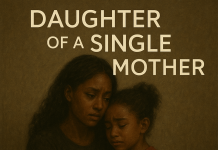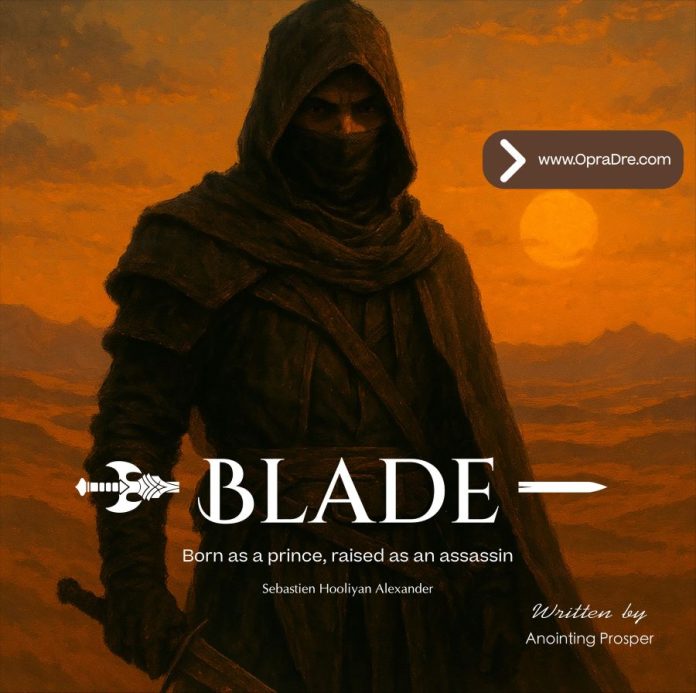CHAPTER EIGHTEEN: A gift of peace
Peace indeed was the state of the heart, not the location of your body.
Blade never imagined he could find peace in the heart of such a chaotic underground city. Yet, for two months now, that was precisely what he had—an almost surreal sense of tranquility.
Frizzy had secured him a job at a carpenter’s shop, assisting the ailing owner in crafting furniture. His tasks ranged from sawing wood into planks to driving screws into structured cabinets and refining the edges of tables. The arrangement was simple: an even split of the earnings—fifty percent for Blade, fifty for the owner.
The shop’s entrance was an exhibition of craftsmanship, a display of bookcases, chairs, tables, and even glazed kitchen cabinets. A silent invitation to passersby—each piece a testament to the owner’s skill and an unspoken plea for business.
Here, he was just another worker. No past. No reputation. No one whispered his name or cast suspicious glances his way. Just ordinary people, exchanging coins for furniture and moving on.
“I don’t know if this will sound offensive, but you were born for this job,” Frizzy remarked, lounging in a newly crafted chair, sipping from a juice pack. “Even seasoned carpenters can’t produce as many couches and chairs as you do in a day.”
Blade raised an eyebrow. “Are you saying I was born to be a carpenter?”
Frizzy gave an uneasy grin.
“Go to work. Now.” Blade’s voice carried an unmistakable edge of playful menace.
“Alright, alright, I take it back,” Frizzy chuckled, raising his hands in surrender. “But you know that’s not what I meant. Besides, there’s nothing wrong with being a carpenter, and you know it.”
Before Blade could respond, two customers arrived—a middle-aged man and a teenage boy.
“I want this one, Father,” the boy declared, pointing to a freshly crafted green chair.
The father approached with a polite nod. “Good day, sir. How much for that chair?”
“Fifteen coins,” Blade answered.
The man’s expression crumpled as if Blade had just struck him. “Fifteen coins?!”
“If you don’t mind me asking, sir,” Frizzy interjected, “why does he need the chair?”
“He’s leaving for his exams soon,” the father explained. “We don’t know what the outside world holds. What if there aren’t any chairs out there? I’m trying to get everything he might need before he goes.”
Blade almost scoffed. The naivety of these people was baffling—either endearing or utterly foolish. He hadn’t decided which.
“You’re sending your son out of the city?” A stranger, an idle passerby, inserted himself into the conversation. “Do you have any idea how dangerous that is?”
The father’s brows furrowed. “Why would it be dangerous?”
“The Robes are on the move,” the stranger said grimly. “They’re tearing through villages, raiding towns—searching for one of their missing elites.”
“Who are the Robes, and why should that concern us?” the boy asked, irritation lacing his tone.
The stranger turned to him. “They’re assassins. A ruthless order. They can kill with a mere glare.”
The boy’s eyes narrowed. “What are assassins?”
Blade exhaled sharply. “And you’re about to take an exam with that head?”
Frizzy snickered, but the boy remained oblivious to the insult.
The father, however, was quick to counter. “But the Robes never leave their citadel. It’s buried deep in the eastern woods.”
“Not anymore,” the stranger said. “They’re hunting now. And worse—the Scarlet Blades have joined them.” He leveled a firm gaze at the father. “If you value your son’s life, keep him here. At least for another year.”
With that, the man walked away, leaving a heavy silence in his wake.
“So what do we do now, Father?” the boy asked, impatience creeping into his voice. “We can’t just skip the exams because of that.”
The father hesitated, his indecision playing out in restless pacing.
Blade, who never offered advice, spoke nonetheless. “To be alive is to have a thousand opportunities at your doorstep. Dead men don’t take exams.”
The father gave a slow nod.
“What does that even mean?” the boy muttered.
Blade ignored him and strode into the shop, retrieving a chainsaw.
“Son,” the father sighed, “we’ll postpone the exam until next year.”
“But, Father—”
“Your life matters more,” the man cut in. “If assassins are on the loose, your journey isn’t safe. What if you run into them? What then?”
The boy’s face darkened with frustration. “Do you even love me?!” he spat before storming off.
“Son!” his father called, but the boy was gone—vanishing into the crowd like smoke in the wind.
Blade placed a steady hand on the man’s shoulder. “It’s better he hates you while alive than resents you from the grave.”
The father gave a half-hearted smile, then hurried after his son.
Frizzy sighed. “The boy doesn’t understand that his father is only trying to protect him.”
Blade leaned back, exhaling. “I’d rather stay a bachelor forever than have an idiot for a son.”
Frizzy shot him a look. “I thought you said people aren’t allowed to leave the city until they’re sixty. So where exactly is that boy planning to take his exams?”
“That’s why parents send their children away,” Frizzy explained. “No father or mother wants their kid trapped here, working themselves to death, when there’s a better life outside.”
Blade nodded slowly. “No wonder they’re so naive.”
“What’s that supposed to mean?” Frizzy bristled.
Blade didn’t bother answering. He simply picked up the chainsaw and got back to work.
__________________________________________✍
With a plastic bag of food in one hand and a wooden plank in the other, Blade’s hands were full, leaving him no choice but to nudge the door open with his elbow.
Lenora, noticing his predicament, stepped forward and took the plastic bag from him. She didn’t greet him with words—only a small, knowing smile. That was her way.
Blade set the plank down on the table, exhaling as he collapsed onto the worn-out couch in the corner. Exhaustion weighed on him.
“How are you?” he asked, his voice heavy with fatigue.
“Fine,” she answered curtly.
She wasn’t particularly cheerful, but she wasn’t drowning in misery either. There was a calmness about her, an obedience he hadn’t seen before. That little talk they had seemed to have done some good.
“What about you?” she asked.
“I’m good.” He pulled the plastic bag closer. “Are you hungry?”
She nodded and took a seat on the plastic chair by the table.
“What’s the occasion?” she asked, watching him as he began unpacking the food.
Blade looked at her, puzzled. “What do you mean?”
“You usually make me show you what I practiced before I eat. But today’s different. Why?”
His brow furrowed. “Is it wrong for me to let you eat first?”
“No, I just—”
“You don’t argue with an elder. Eat first. You can show me your stances later.” His tone was final.
He wasn’t about to debate with a child.
Lenora fell silent and took the styrofoam container from him, lifting the lid to reveal a steaming plate of pasta.
Blade had already eaten before coming home. He simply watched as she dug into her meal, noting the fresh bruises and scrapes on her arms. She had trained hard today. Harder than usual. He knew she was still just a child, but the world didn’t care for excuses.
Many are mad. Few are roaming.
Some people lacked the sense not to do certain things in front of children. He had no intention of letting her grow up weak, of allowing her to become a burden to herself or anyone else. She had to be stronger than him. Strong enough to survive, even in his absence.
“What about Friz—”
She never finished the sentence. The pepper had gone the wrong way, burning up into her nasal cavity.
A violent fit of coughing seized her, her small frame shaking as she gasped for breath. Blade was on his feet in an instant, hitting her back—firm enough to dislodge the pepper, but careful not to hurt her.
She coughed and sputtered, eyes watering, struggling to breathe. He grabbed a cup of water, pressing it into her hands, urging her to drink. The coughing fit slowly subsided, fading into ragged breaths.
Blade crouched beside her, scanning her face for any lingering distress. “Are you okay now?”
She nodded, still shaken.
With a heavy sigh, he dropped to the floor, landing with a loud thud. His pulse was only now beginning to steady. That had scared him more than he wanted to admit.
“How many times have I told you not to talk while eating? What if I wasn’t home?” His voice was sharp, edged with lingering fear.
Lenora shrank slightly, curling her toes, her face still flushed from the ordeal.
“I’m sorry for making you worry,” she murmured.
“And you’re still talking?” His scolding intensified, cutting off any further words. “Not another word until you finish eating.”
She clamped her mouth shut as he got up to fetch her another cup of water.
I must admit, raising a child isn’t easy.
Blade shook his head as the thought settled in his mind.
No job had ever suited him better than the one he was trained for—the job of a killer.
The past two months with Lenora had been nothing short of exhausting. The first week alone had tested every ounce of his patience.
If she cut her finger, she cried.
If she was hungry, she cried.
If he scolded her, she cried.
If she fell, she cried.
She cried at everything. And the more he scolded, the harder she cried.
Blade hated how soft-hearted she was.
Frizzy had witnessed his struggles firsthand. Sometimes, Blade would just sit there, utterly lost as she wailed. Her cries would fill the entire room, an unrelenting, high-pitched siren. Once, she had cried through the entire night. The memory alone sent a shiver down his spine.
He couldn’t kill her to silence her. But nothing else seemed to work, either.
Frizzy had been the one to help, buying her small toys, taking her outside to play, distracting her when the tears became unbearable.
And just like that, she began trusting Frizzy too much. Just like she had trusted Milani.
Blade didn’t know what to do with her. Handling weapons was far easier than handling a child.
Eventually, after one too many sleepless nights, he found a solution.
The next time she cried, he didn’t scold her. He punished her.
She was made to hold the riding-bicycle position—legs spread, arms extended as if gripping handlebars—squatting in the air for two hours straight.
No one was allowed to intervene. Not even Frizzy.
It worked.
She cried less and less, realizing that no savior was coming for her.
But then, a new problem arose.
A week into the punishment, her body began to fail her. Fever. Weakness. Body aches.
Two weeks of sickness followed.
Blade and Frizzy tried every medicine they could find, but nothing seemed to work.
Then, Blade understood.
To him, the riding-bicycle stance was simple. To her, it was torture. Her body wasn’t strong enough to endure it.
So, he changed his approach.
Coincidentally, it was around this time that Frizzy got Blade a job, which meant he couldn’t be home as often. He needed her to toughen up—but in a way her body could handle.
That’s when he introduced martial arts.
He built her a wooden training dummy, reinforcing its midsection with cushions. He taught her how to kick it, then left her to practice all day while he was away.
The next day, he taught her how to jab. She practiced that, too.
Day after day, little by little, she improved.
It had been two weeks now.
She was no longer the same fragile girl who cried over every little thing.
When Blade returned to the room, she had finished her meal. He handed her another cup of water, watching as she drank deeply.
His gaze drifted to her hands, her feet—fresh blisters marred her skin.
It reminded him of himself. Of his own childhood, littered with wounds no one had bothered to treat.
Without a word, he retrieved the first aid box from the corner of the room and sat on the bed. With a simple gesture, he beckoned her over.
She obeyed, though her confusion was plain on her face.
Blade patted the space beside him. She sat.
He dipped a cotton ball into a balm and gently dabbed the blisters on her feet.
“If you leave these untreated, they’ll turn into sores and make it painful to walk,” he murmured as he worked.
She watched him in silence.
It wasn’t that he didn’t want to pamper her.
But pampering her would do more harm than good.
From the moment they met, she had been in survival mode.
There was no prince charming waiting for her.
No savior.
She had only herself.
And that had to be enough.








